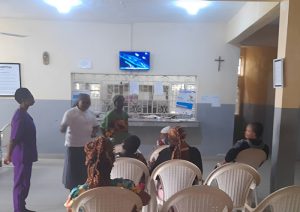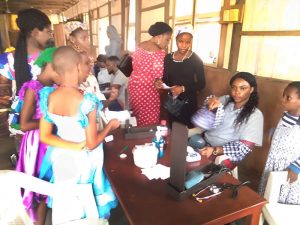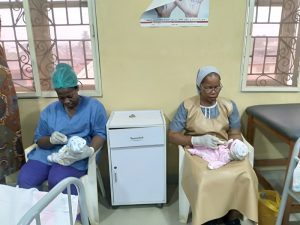Sharing our story of the Mother Mary Martin Hospital, Benin City, Nigeria By Srs. Ufuoma Ogigirigi & Elizabeth Ogar, MMM
It all began in July 2021. It was set up as a home based and mobile outreach clinic working in 5 Local Government Areas, providing preventative, curative and rehabilitative care, elderly care, palliative care, maternal and child health, health education and awareness raising through sensitization. It has a strong collaboration with MOH, local government, community leaders and education boards. The Hospital has a geographical link with Teaching Hospital and University of Benin. As such, 40% of the local population is made up from these 2 institutions (students, academics, medical and paramedical staff). The remaining 60% of people are socioeconomically vulnerable, they lack affordable access to health services; of these 10% are children under 5 yrs, 12% are young people vulnerable to rape and abuse, 22% are women of childbearing age.

 Uselu is a densely-populated neighborhood of Benin City, Edo State, Nigeria. Benin City is the capital and largest city of Edo State, southern Nigeria. It is the fourth-largest city in Nigeria according to the 2006 census, after Lagos, Kano, and Ibadan. Benin City is the centre of Nigeria’s rubber industry, and oil production is also a significant industry. The indigenous people of Benin City are the Edo people (the Benin People), and they speak the Edo language or Bini Language. The people of the city have one of the richest dress cultures on the African continent and are known for their beads (the beads stand for royalty and usually stand out during the traditional marriage of the Benin people), body marks, bangles, anklets, raffia work. They survive on subsistence farming of yam, plantain and cassava. In 2022, the population of Edo State was 4,777,000.
Uselu is a densely-populated neighborhood of Benin City, Edo State, Nigeria. Benin City is the capital and largest city of Edo State, southern Nigeria. It is the fourth-largest city in Nigeria according to the 2006 census, after Lagos, Kano, and Ibadan. Benin City is the centre of Nigeria’s rubber industry, and oil production is also a significant industry. The indigenous people of Benin City are the Edo people (the Benin People), and they speak the Edo language or Bini Language. The people of the city have one of the richest dress cultures on the African continent and are known for their beads (the beads stand for royalty and usually stand out during the traditional marriage of the Benin people), body marks, bangles, anklets, raffia work. They survive on subsistence farming of yam, plantain and cassava. In 2022, the population of Edo State was 4,777,000.

The main focus of our work
The Mother Mary Martin Hospital is a secondary Health Care facility that runs general outpatient, maternal and child welfare clinics which aim at providing quality and affordable health care to the general population as well as ensuring that pregnant women go into labour and deliver their babies safely. The Hospital offers holistic health care through preventive and curative services facilitating the people to be more health conscious and so, make informed decisions about their health. We have a robust yearly medical outreach plan for our different catchment areas where we create awareness about medical conditions like Hypertension and Diabetes. During these outreach programmes in the rural communities, women, children, the poor, the marginalized and people with disabilities avail of our waiver scheme on the medical screening tests/treatment for Malaria, Diabetes, Blood Pressure and Weight checks.
Children are admitted in an open ward in the company of their attendants. The ward is made up of 3 paediatric cots with rails to prevent the children from falling off the cot and sustaining injuries. The cots are arranged in a way that babies receiving care do not come in contact with each other. The newborn unit also has a separate ward for babies delivered outside the Facility to prevent cross infection. There is a Phototherapy machine, Continuous positive airway pressure machine (CPAP) Oxygen supply etc. The maternity area has three open wards and 1 private room with a total of 9 beds. The wards accommodate women in labour, post-natal, sick antenatal and other obstetric and gynaecological cases. The beds are spaced very well for easy movement and to prevent hospital acquired infections. There is constant electricity and water supply in the hospital and maternity area which is generated from solar energy, Power Holding Company (the national grid) and a standby generator. There is constant effort to maintain the buildings, make the wards hospitable and keep patients safe while admitted. There are separate wards for male and female patients for proper patient management. Each employee signs the staff code of conduct which spells out all that is expected for everyone for the maintenance of a safe environment. Generally, there are 24 hours staff supervision and monitoring of care administered to patients.
 Some vulnerable adults are attended to in their homes and familiar environment during home- based care and visitations. Their family members are trained and guided on the needed care and support.
Some vulnerable adults are attended to in their homes and familiar environment during home- based care and visitations. Their family members are trained and guided on the needed care and support.
FUTURE PLANS
Procurement of X-ray machine
Registering with NHIS
Continuous capacity updating through serial training for personnel.
Recruitment of additional staff (5 at least)
Commencement of weekend laboratory services
